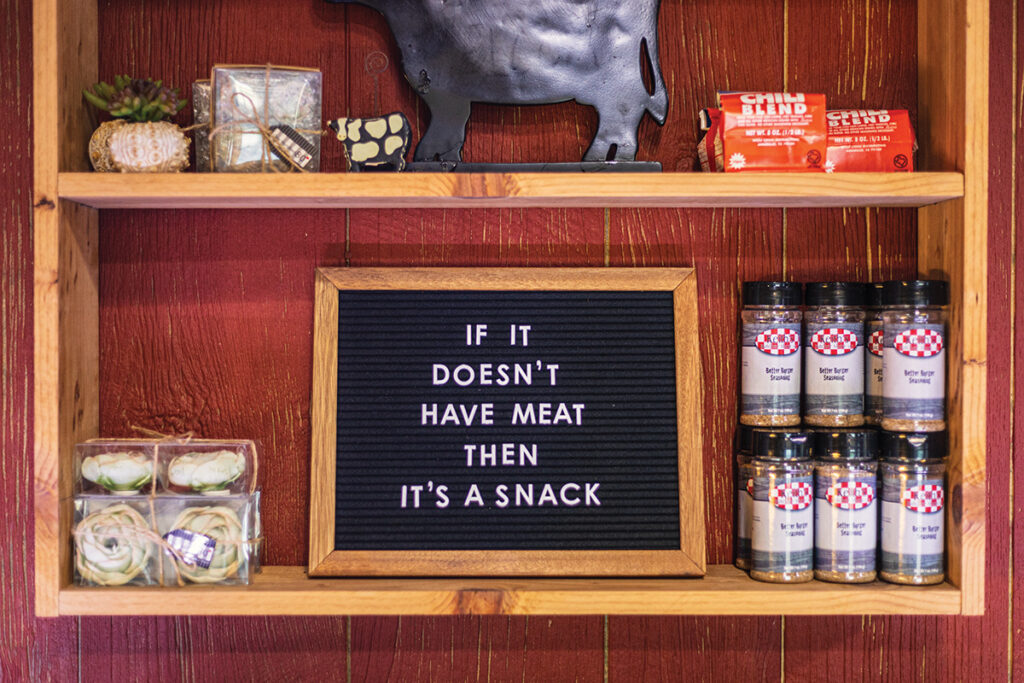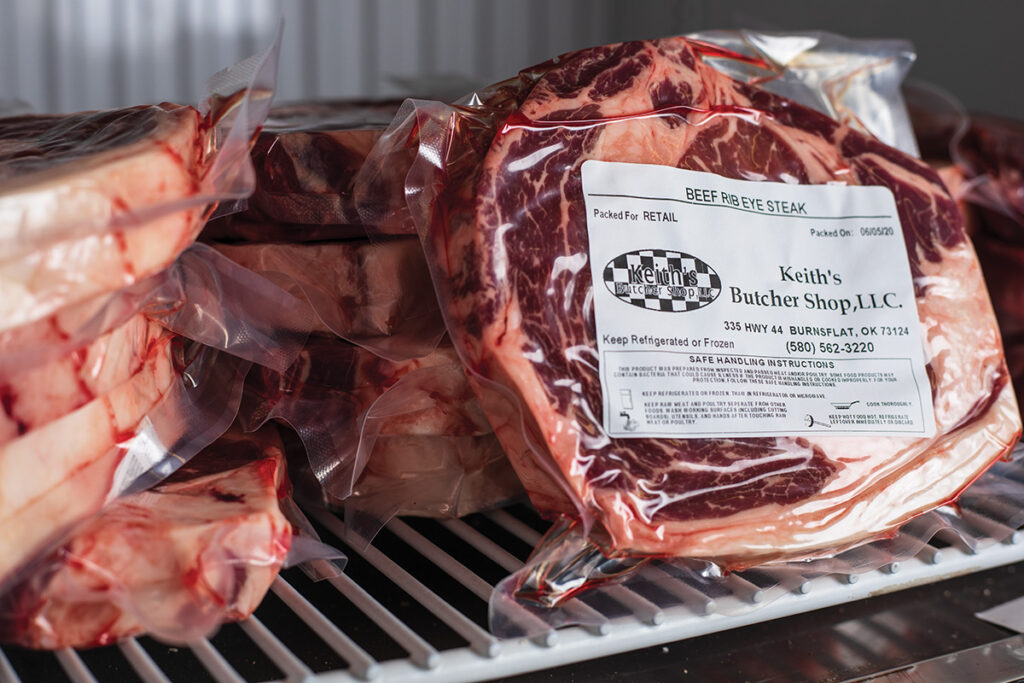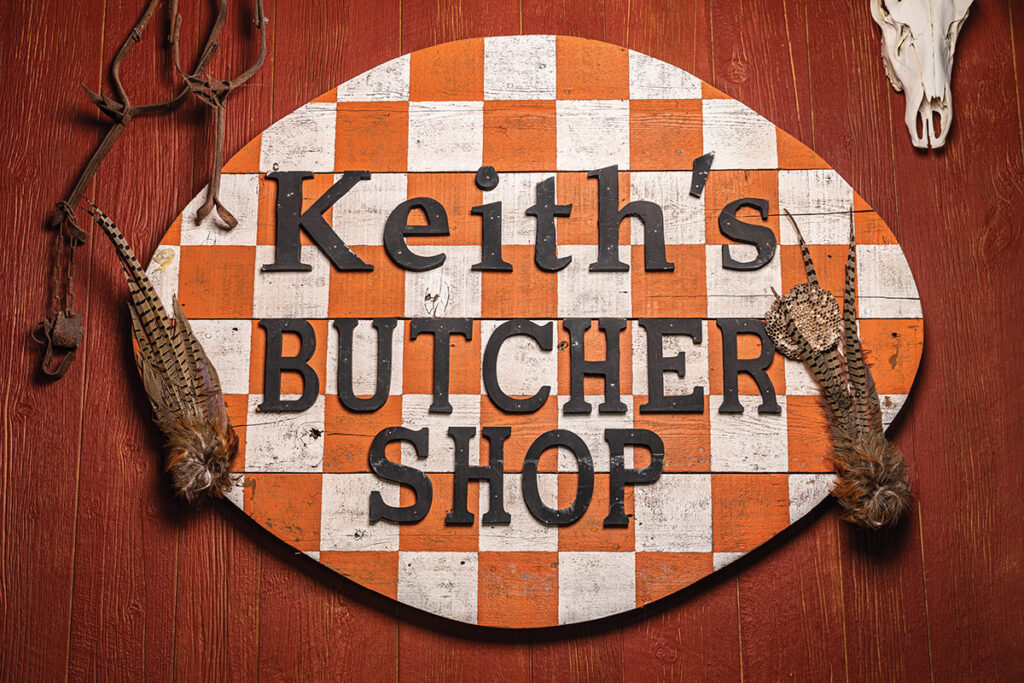I want everyone within 100 miles to associate Keith’s Butcher Shop with quality and to come here because we do the best job.
Keith Schneberger, owner of Keith’s Butcher Shop
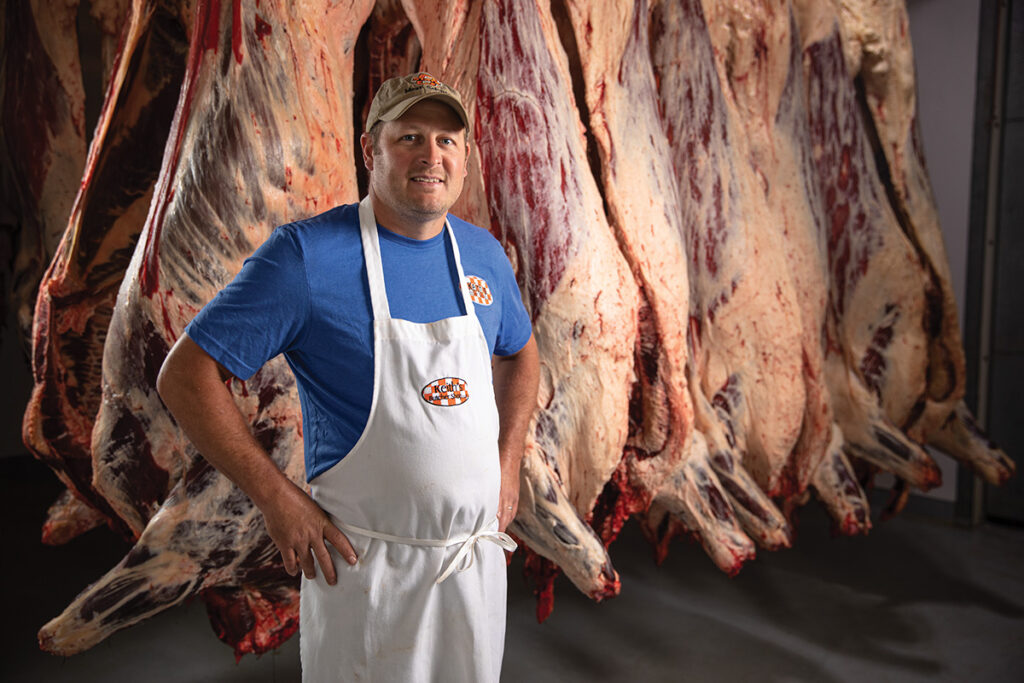
The concept of purchasing large quantities of beef such as a quarter, half or even a whole custom-processed animal disappeared from the mind of the general consumer more than a generation ago. Picking up a to-go order from a favorite restaurant on the way home from work or the ease of being able to swing by a supermarket meat counter to pick up cuts of meat for dinner that night has become the way a vast majority Americans purchase the beef, pork or lamb they consume.
In recent months, however, as meat counter shelves in stores and butcher shops alike lay empty – not because of a shortage of the meat supply in the United States, but simply because of a shift in demand – consumers began searching elsewhere to find the protein they needed and wanted.
For many Oklahomans, that meant buying directly from the producer or local butcher.
This is where small, family-run businesses like Keith’s Butcher Shop come into play.
Located in the small western Oklahoma town of Burns Flat, Keith Schneberger, along with his staff of four, have been in overdrive the last few months.
“There have always been people buying halves and quarters (of beef), but now there are lots of new people,” Keith said. “A lot of people didn’t know that you could go to a local farmer or butcher shop and buy a quarter or a half. A lot of people think it comes from a package in Walmart, honestly.”
As consumers were faced with empty store shelves as the COVID-19 pandemic quickly escalated, the interest in custom-processed beef purchased directly from a farmer or rancher ballooned. Coupled with a growing curiosity of how food is grown and processed, Keith saw a surge in demand for his processing prowess.
From Keith’s perspective, the recent uptick in business has been good, but it also has its downsides. Due to both the size of his staff and his facilities, Keith has to be realistic with what they are capable of doing on any given day while continuing to provide each and every customer with the quality the shop strives to achieve.
“We are probably processing a few more animals than we usually do, but we are booked out a lot farther, and that is not sitting well with a lot of people,” Keith said. “A lot of people will call when they have 90 to 100 days left before their animal is ready to make an appointment. Now, that is not the case.”
As of June 2020, Keith’s Butcher Shop was fully booked until July 2021, oftentimes filling up an entire month on the calendar in just single day.
Keith had multiple families contact him in late spring to try and schedule a time to process their animals. In a one-month timeframe, he had close to 200 customers inquire about processing but not schedule because they just could not wait an entire year. Many of those potential customers have all been new.
Even with the challenges he and his staff have faced in the last few months, he cannot imagine doing anything else. Fifteen years ago, however, as Keith was nearing the end of his college career and weighing his options, what is known today as Keith’s Butcher Shop almost never existed.
Keith, who serves as the owner and operator of Keith’s Butcher Shop, first built his Burns Flat facility in 2008, and later expanded by adding a second storefront location in Elk City that he owns and operates in conjunction with his brother.
As an Oklahoma State University student, Keith began working at the meat lab located in the Robert M. Kerr Food and Agricultural Products Center on campus. Processing different products such as beef, swine, lamb, cooked products, vegetables and even helping graduate students with their research projects, Keith was able to gain a wide array of experience in just four short years.
What started off as just a college kid needing a job quickly grew into something he enjoyed and at which he excelled.
“Prior to college, I had no desire at all for what I am doing now,” Keith said, grinning, reflecting on his plans during high school. “If I would not have needed a job in college and did not know a friend – of a friend of a friend – that worked there and helped get me into the program, I would probably be doing something different today.”
As a senior in college and with graduation quickly approaching, Keith knew that he had three options after graduation: return to Burns Flat and farm with his father, begin working in the oilfields or take a leap of faith and start his own business processing animals in his hometown.
While trying to decide which avenue he would pursue, three local processing businesses in western Oklahoma went out of business.
“They were just a dying breed out here,” Keith said.
Soon it became clear to him what his post-college plans would entail.
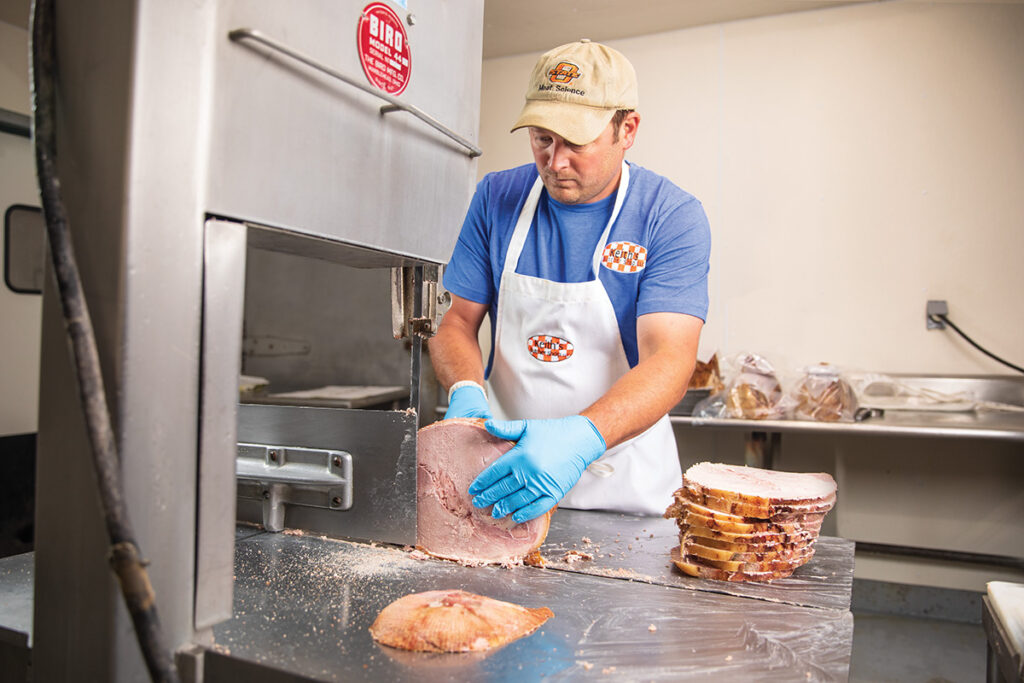
Around that time, with the oilfield activity taking off in the region, Burns Flat started an economic development program to entice local businesses to the area. Already having a desire to return to rural Oklahoma where both he and his wife grew up, everything seemed to be falling into place.
With help and guidance from his family, he set off on a new adventure, purchasing equipment from those three butcher shops that were going out of business to equip his own.
Since venturing out on his own, Keith has learned what to expect for each season, and he plans accordingly. Beef cattle fill his locker year-round, supplemented with swine in the spring and fall. As hunting season and the holidays approach, deer, turkeys and smoked meats become common items for him to process and cure.
While Keith’s may be known to most in western Oklahoma as a place to take livestock for high-quality custom processing, the shop also sells single packages of meat products to consumers who stop by the retail store. Freezers and refrigerators line the front of his shop in Burn Flat filled with packages of ground beef, bacon, sausage, hamburger patties, ribeye steaks and much more cut right there in the shop. In recent months, keeping these cases full has presented a second challenge for Keith.
Keith possesses a custom exempt meat processing permit that allows him to offer custom processing to area farmers and ranchers. However, the retail-packaged cuts of meat he sells directly to consumers are required to come from a federally inspected facility.
Keith has faced the same level of difficulty, to a certain degree, that most grocery stores and meat counters across the nation are facing as they try to source animal protein during a pandemic. It has been a challenge to find the exact cuts and quantities needed to fill the storefront in the last few months, and what he has been able to acquire is priced much higher than normal.
“The meat I get for retail, the price has gone through the roof,” Keith said of the recent increase in meat prices nationwide.
Accustomed to purchasing exactly what he needs at a moment’s notice, placing an order that is swiftly fulfilled is not the case for Keith anymore.
“For the last three weeks, I cannot get any of that (meat),” Keith explained. “If I can, it is only one box and the price is double.”
When Keith purchased a box of ribeye rolls in April, which are then cut down to the typical ribeye steaks consumers are accustomed to seeing, he had to pay $533. This time last year, that same box of ribeye rolls was nearly half the price, raising his cost and his consumers’ nearly 50%.
“If I want to make a dollar, that is what I have to charge,” Keith laments. “I don’t know who wants a $30 steak and then have to go home and cook it. If I’m going to spend that much money, I’m going to go to a nice restaurant and sit down.”
For the time being, his current ground beef prices have not reached the same increase in price due to the fact he purchased a large quantity of the cuts he uses to make ground beef prior to the markup. Unfortunately, if he has to purchase more soon, he will be forced to sell ground beef for $8 or $9 a pound.
Even with all the challenges that seemingly came out of nowhere for Keith and employees, he still loves the business, his customers and the rural community that has become a destination for custom processing along with the Schneberger family’s retail shop.
In addition to working at the butcher shop full-time, Keith can also be found out in the field with his dad or brother farming in the Burns Flat area, serving as coach of the local county 4-H club meat judging team, or being dad to his three children – Waverly, Whitten and Wren.
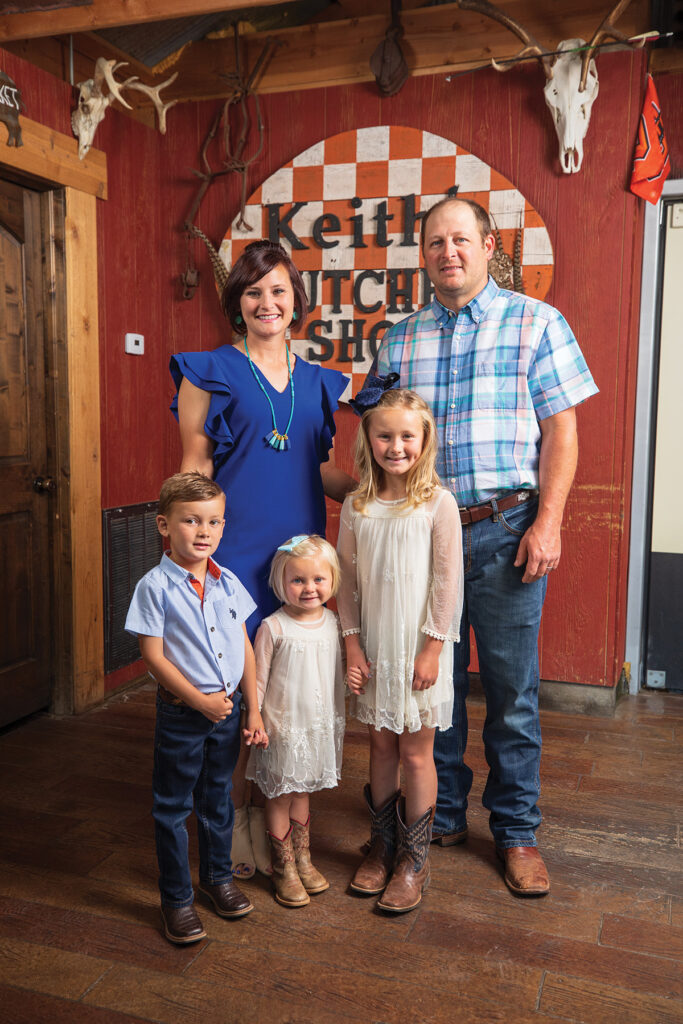
For Keith and his wife, Erin, most of their days are spent at the shop, making it a second home for them. As their usual customers come in and out to pick up their order or purchase a few packages of beef for dinner that night, they are often greeted with a smile and a wave by their children. If you are lucky, Waverly may even be the one to step up to the front counter to help you with your payment.
As time progresses and business begins to shift into a new normal for Keith and his family, one thing will remain constant. Just like before, his three children will continue to roam the family business, learning more each day about the shop they will eventually inherit and the quality their father expects.
“When people ask where they should take their animal, I want them to come here,” Keith said. “I want everyone within 100 miles to associate Keith’s Butcher Shop with quality and to come here because we do the best job.”
